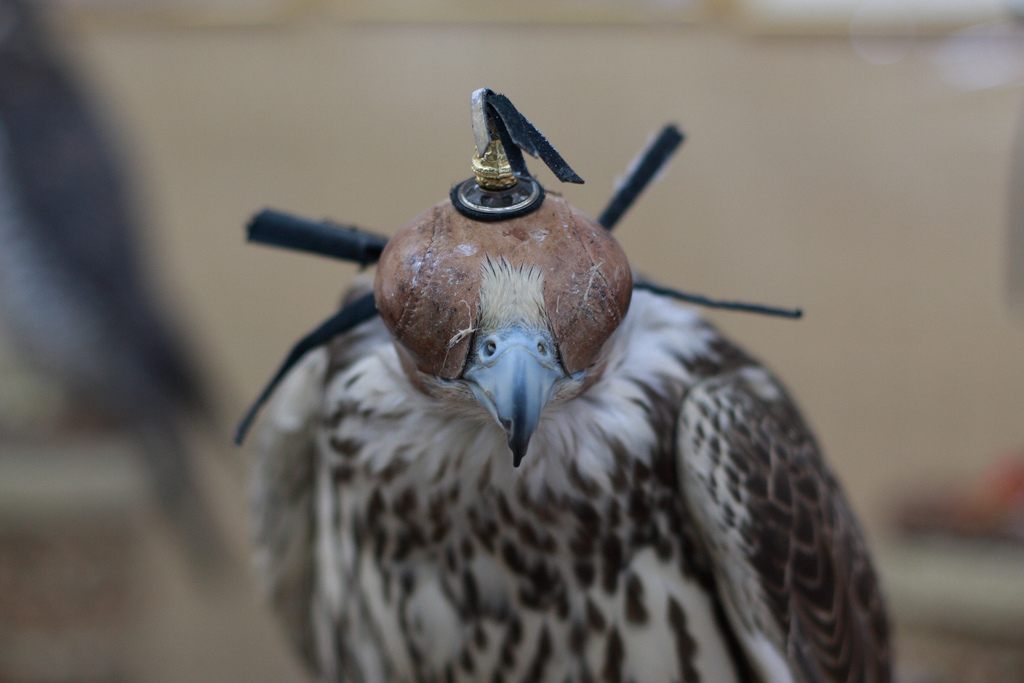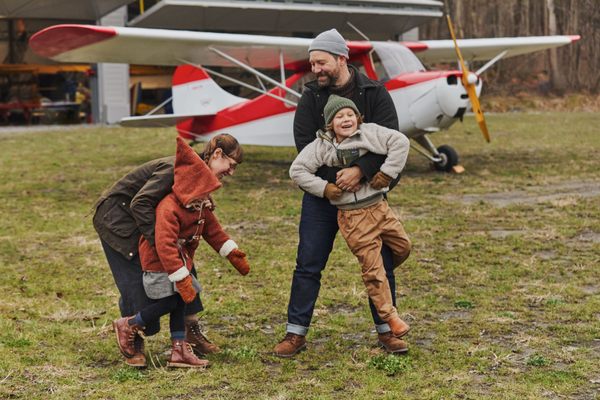Object of Intrigue: A Passport for Falcons
 A blindfolded falcon ready to rack up some sweet frequent flier points. (Photo: yeowatzup on Flickr/Creative Commons)
A blindfolded falcon ready to rack up some sweet frequent flier points. (Photo: yeowatzup on Flickr/Creative Commons)
If you’re boarding a flight to or from the United Arab Emirates and spot a blindfolded falcon hanging out in first class, do not be alarmed. The bird of prey is allowed to travel in the cabin and has been subjected to the same stringent security checks as you have—including passport control.
In the Emirates, falcons get issued their very own forest green passports. The unusual documentation scheme is due to the fact that, in the U.A.E, falcons are highly prized and therefore attractive to smugglers. Falconry, in which the birds of prey are trained to hunt, is a significant part of the region’s Bedouin heritage.
Though the U.A.E.’s desert dwellers no longer rely on falcons for food delivery, falconry continues as a sport and source of national pride. An annual falconry festival in Abu Dhabi lures hawks and their trainers from around the world. Falconers from the region travel the Persian Gulf and beyond with their birds to engage in festivals, competitions, and displays. Hence the need for passports and first-class accommodation.
A top falcon can sell for up to $1 million, writes Ali Al Saloom in The National. The high value of well-bred birds has led to an illegal trade—which is why, in 2002, the Convention on International Trade in Endangered Species of Flora and Fauna (CITES) moved to crack down on falcon smuggling by introducing a mandatory falcon passport for jetsetting birds of prey.
 Abu Dhabi Falcon Hospital director Dr. Margit Muller displays the relevant falcon documentation. (Photo: Eric Elder)
Abu Dhabi Falcon Hospital director Dr. Margit Muller displays the relevant falcon documentation. (Photo: Eric Elder)
Each passport corresponds to a particular falcon. That falcon must also be fitted with a leg ring inscribed with an identity number that ends up on the passport. This guards against one bird impersonating another. Sadly, the passports do not require photos, but falcons, you’ll find, are somewhat hard to tell apart based on their head shots alone. They also travel with tiny, eye-covering leather helmets on their heads in order to stay calm, making face-based identification even more difficult.
CITES stipulates that, when flying with an avian companion, a falconer must present the bird’s passport to a border control officer, who, as with human passports, “should validate it with an ink stamp, signature and date to show the history of movement from State to State.” Passports are issued by the UAE’s Ministry of Environment and Water for a fee of 500 U.A.E. dirhams—around $136 USD—and remain valid for three years.
The passport “certifies the legal origin of the falcons used for falconry and ensures smooth and easy documentation for falcon travels,” says Maribel Broso of the Abu Dhabi Falcon Hospital. After being issued a passport, the birds may fly accompanied by their falconers to eight countries: Bahrain, Kuwait, Oman, Qatar, Saudi Arabia, Pakistan, Morocco, and Syria.
In September 2013, Gulf News reported that over 28,000 falcons had been issued with passports since 2002. The UAE’s scheme—the first falcon passport in the world—has also influenced other countries in the Gulf. Last year, Bahrain, Kuwait, Oman, Qatar, and Saudi Arabia all agreed to issue their own CITES-approved passports for falcon travel.
 Fly, my pretty! But get the required documentation first. (Photo: cloudzilla on Flickr/Creative Commons)
Fly, my pretty! But get the required documentation first. (Photo: cloudzilla on Flickr/Creative Commons)



















Follow us on Twitter to get the latest on the world's hidden wonders.
Like us on Facebook to get the latest on the world's hidden wonders.
Follow us on Twitter Like us on Facebook